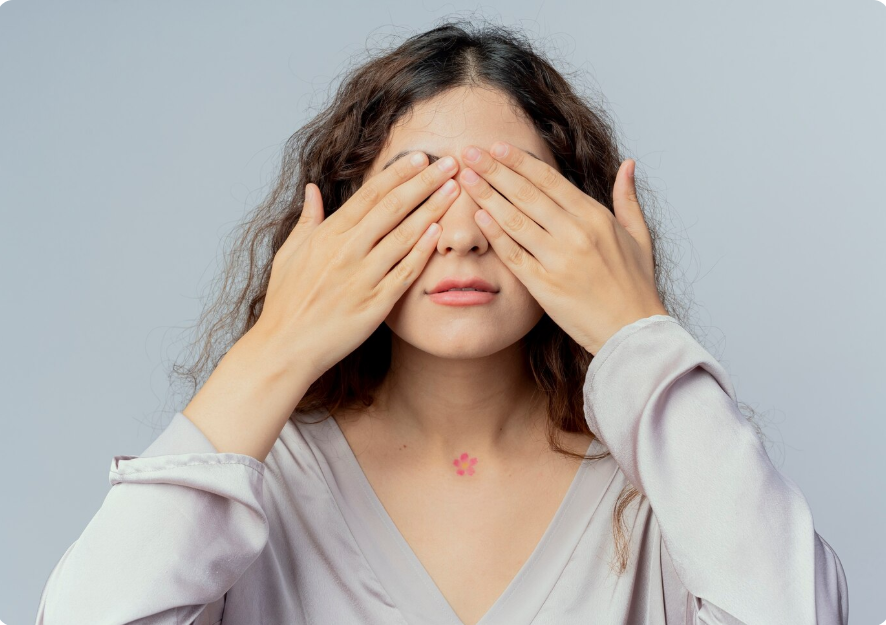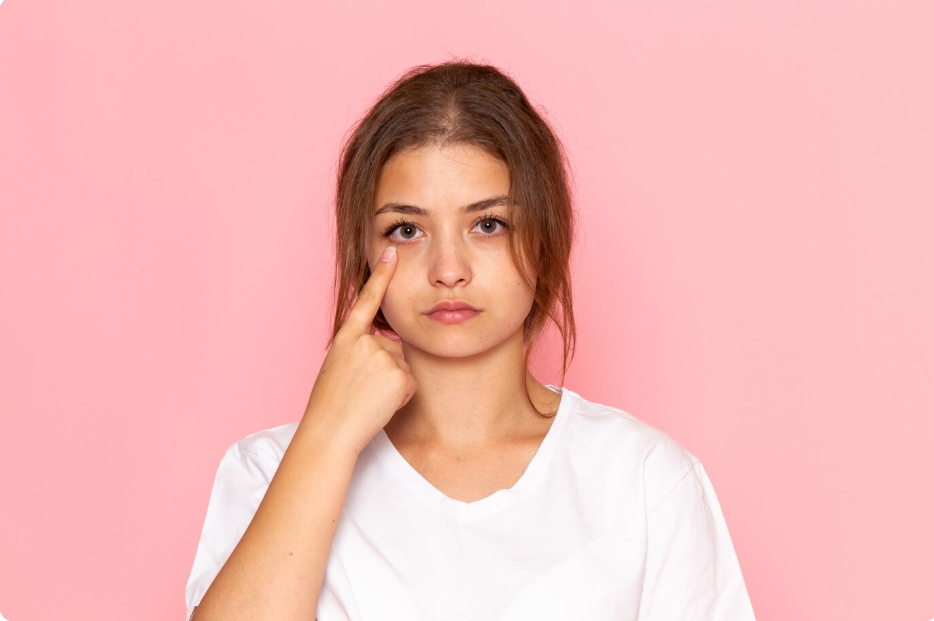Dark circles around the eyes are a common cosmetic concern, affecting people of all ages, genders, and ethnicities. While they are often viewed as a mere aesthetic issue, the presence of dark circles can sometimes indicate underlying health concerns or lifestyle factors. In this blog post, we’ll explore the real reasons behind dark circles, the deficiencies that can cause them, and what you can do to reduce their appearance.
Why Do Dark Circles Appear Around the Eyes?
Dark circles, also known as periorbital dark circles, are characterized by the presence of dark, shadowy areas under the eyes. These circles can range from a subtle discoloration to a more prominent darkening that can make you appear tired or older. But why do these dark patches form in the first place?
The skin under the eyes is delicate and thin, which makes the blood vessels beneath more visible. Several factors contribute to the appearance of dark circles, but the primary reasons often involve increased visibility of blood vessels or a lack of proper circulation.

1. Thinning Skin
As we age, the skin naturally becomes thinner and loses its elasticity, which is especially noticeable around the eyes. This thinning makes the underlying blood vessels more visible, giving rise to dark circles. The skin around the eyes is already quite thin, so any change in its structure—such as decreased collagen production—can make the blood vessels more prominent.
2. Poor Circulation
Circulation plays a significant role in the appearance of dark circles. When circulation around the eye area is poor, blood tends to pool in the veins, which can cause a bluish or dark tint to the skin. This is more likely to happen if you’re dehydrated, fatigued, or stressed, as these factors can affect your circulation.
3. Excessive Sun Exposure
While a tan is typically associated with glowing skin, excessive sun exposure can actually worsen dark circles. When the skin is exposed to UV rays, it produces melanin to protect itself from damage. Over time, this can lead to an increase in pigmentation around the eyes, making dark circles appear darker.
4. Allergies
An allergic reaction might trigger inflammation and puffiness in the nasal areas and in the vicinity of the eyes, which may subsequently lead to the development of dark circles. In trying to assist with the issue, your body also releases histamine which in turn causes inflammation and swelling of the tissues. Additionally, the inflammation of the tissues may also cause blood vessels to expand. This makes the blood vessels near the dark circles to be even more vascularized. Furthermore, during allergic reactions, most people tend to rub or scratch the eyes, which in turn, worsens the condition.

What Is the Real Reason Behind Dark Circles?
While the factors mentioned above are common contributors, the real reason behind dark circles often lies in a combination of genetics, lifestyle, and environmental factors. Understanding these underlying causes can help you pinpoint the most effective treatment options.
1. Genetics
Your genetic makeup plays a significant role in the development of dark circles. If your parents or grandparents had prominent dark circles, you might be genetically predisposed to develop them as well. In such cases, dark circles may be an inherited trait rather than a result of lifestyle factors.
Genetics can influence the structure and thickness of the skin, the amount of melanin produced in the body, and the presence of certain vascular conditions—all of which contribute to the appearance of dark circles.
2. Aging
Aging is a natural process that significantly impacts the appearance of the skin. As we age, collagen production decreases, and fat deposits around the eyes begin to diminish. This loss of support causes the skin to sag, which makes the blood vessels more noticeable. Aging skin also loses its elasticity, which can cause the skin around the eyes to wrinkle and fold, further accentuating dark circles.
3. Sleep Deprivation
Lack of sleep is a major contributor to dark circles. When you don’t get enough sleep, the blood vessels around your eyes can become dilated, making the area appear darker. Additionally, tiredness causes the skin to look pale, which contrasts with the darker blood vessels beneath, making them more noticeable. Sleep deprivation can also lead to fluid retention, which may cause puffiness or bags under the eyes.

What Deficiency Causes Dark Circles Around the Eyes?
Several nutritional deficiencies can contribute to the development of dark circles. These deficiencies can cause a variety of health issues, including poor circulation, weakened skin, and impaired immune function—all of which can worsen the appearance of dark circles.
1. Iron Deficiency (Anemia)
The most common reasons for dark circles under the eyes is iron deficiency, especially among women. The importance of iron cannot be understated. It is crucial in the production of hemoglobin which is a red blood cell protein that carries oxygen to various parts of the body.
When iron levels are low, the body becomes fatigued, and blood circulation can suffer, causing blood vessels around the eyes to appear darker. People with anemia often notice dark circles alongside other symptoms such as fatigue, dizziness, and paleness.
2. Vitamin K Deficiency
Vitamin K plays a crucial role in blood clotting and improving blood circulation. It helps strengthen the walls of blood vessels and prevent them from leaking blood under the skin. A deficiency in Vitamin K can cause blood to pool under the eyes, leading to dark circles. Vitamin K is found in green leafy vegetables like spinach, kale, and broccoli, as well as in dairy products and fish.
3. Vitamin B12 Deficiency
Vitamin B12 is essential for the proper functioning of red blood cells and the nervous system. When levels of this vitamin drop, it can cause anemia, which, as mentioned earlier, contributes to dark circles. A B12 deficiency can also lead to pale skin and fatigue, both of which accentuate the appearance of dark circles.
4. Vitamin C Deficiency
Vitamin C is vital for collagen production, which helps keep the skin firm and resilient. A deficiency in Vitamin C can weaken the skin around the eyes, making blood vessels more visible and leading to the formation of dark circles. Vitamin C also has antioxidant properties that help combat inflammation and support overall skin health.
5. Dehydration
Although not a specific nutrient deficiency, dehydration can exacerbate the appearance of dark circles. When the body is dehydrated, the skin becomes more prone to sagging and can lose its healthy, radiant appearance. Proper hydration is essential for maintaining healthy skin and improving circulation, which can reduce the prominence of dark circles.
Why Are the Circles Around My Eyes Getting Darker?
If you’ve noticed that the dark circles around your eyes are becoming darker over time, several factors could be at play. Here’s why this might be happening:
- Cumulative Effects of Aging: Aging affects the skin around the eyes by becoming thinner and losing elasticity which makes dark pigmentation more pronounced. In addition, some of the supportive fatty tissue around the eye weakens and lessens over the years. This leads to a hollow (sunken) appearance which worsens the dark shadowing.
- Lifestyle Factors: Insufficient diet and sleep, smoking, and drinking too much alcohol can worsen eye dark circles as well. As above, these lifestyle choices can obstruct blood flow, decrease collagen levels, lead to a lack of water and moisture, which will, in turn, worsen dark.
- Allergic Reactions: Allergies can inflame blood vessels and can be associated with hay fever or sensitivity to certain cosmetic and beauty products. This can result in increased vascularity around the eyes and consequently darken the skin around the eyes
- Sun Exposure: Prolonged sun exposure can increase melanin production around the eyes, leading to darker pigmentation in the skin. If you’re not using sunscreen regularly or if you’re spending extended periods of time outdoors, this could be contributing to the darkening of the circles under your eyes.
How to Reduce the Appearance of Dark Circles
While dark circles can sometimes be unavoidable due to genetics or aging, there are several ways to minimize their appearance:
- Get Enough Sleep: Ensuring you get 7-9 hours of sleep each night can help improve blood circulation and reduce the visibility of circles.
- Hydrate: Drink plenty of water throughout the day to keep your skin hydrated and support proper circulation.
- Use Sunscreen: Protect your skin from UV damage by applying sunscreen daily, especially around the eyes.
- Eat a Balanced Diet: A diet rich in vitamins, minerals, and antioxidants can help improve skin health. Consider incorporating more Vitamin K, Vitamin C, Vitamin B12, and iron-rich foods into your meals.
- Use Eye Creams: Eye creams containing ingredients like caffeine, retinol, hyaluronic acid, and Vitamin C can help improve circulation, boost collagen production, and brighten the skin around your eyes.
- Consult a Dermatologist: If your circles persist despite lifestyle changes, it may be helpful to consult a dermatologist for professional treatments such as chemical peels, laser therapy, or fillers.
Conclusion
The skin surrounding our eyes is particularly delicate and is often the first to show signs of aging. Dark and puffiness is not uncommon and often makes one look tired and dull. More often than not, this problem can be the result of various tissues changes around the eyes. Genetic predisposition, changes related to aging, inadequate sleep, and certain nutritional deficits can contribute significantly. Even though they do not affect our overall health, knowing the causes can help in making changes in one’s diet and daily routine, eventually helping in regaining the youthful glow.
With some simple changes to one’s diet, sleep schedule, and skincare regimen, one can greatly improve the health of the skin and bring back the radiance around this vulnerable area. Modern day skincare, spanning from sodium hyaluronate to collagen masks, can do wonders if the right regimen is implemented. Aside from the skincare aspects, nutritional adjustments, along with proper rest, can to a great extent help regain healthier skin.
